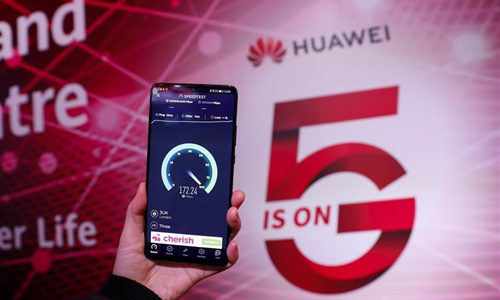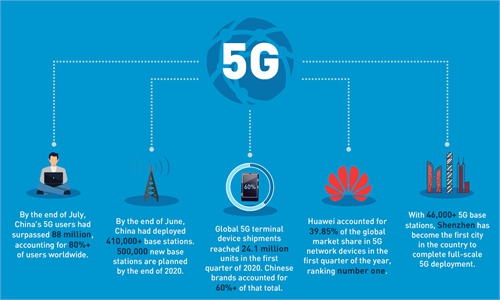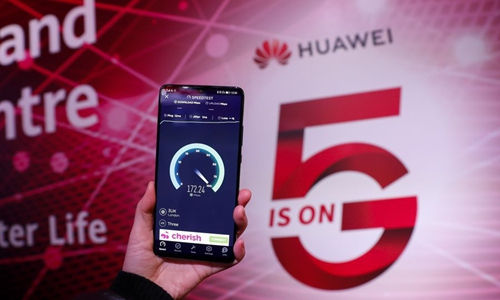SOURCE / INDUSTRIES
Russia is firm in 5G cooperation with Huawei: experts

File photo taken on Jan. 28, 2020 shows a Huawei 5G mobile phone testing speed in Huawei 5G Innovation and Experience Center in London, Britain. Huawei is "focused on keeping Britain connected" and that is "the biggest contribution we can make" to its national effort against the COVID-19 pandemic, said Huawei's Vice President Victor Zhang in an open letter released on April 13, 2020. Photo:Xinhua
The strengthening strategic high-tech partnership of Russia and China in 5G amid a US-initiated tech cold war against China is predictable, given the solid mutual trust between China and Russia and the open attitudes of both sides on welcoming new technologies, and resisting the bully of the Trump administration.
Experts predicted that Russia's embrace of Huawei's technology will also provide a strong lead in the wider region, where countries of the former Soviet Union are very similar in terms of technology concepts and standards.
The Russian Embassy in China told the Global Times Monday that Russia will not halt any cooperation with China in 5G or with Chinese companies such as Huawei. Russia is interested in engagement with other states in order to create together new technologies and promote them in everyday life, the embassy said.
Russian Interfax reported that Moscow is ready to cooperate with Huawei on 5G technology, which Russia is currently trying to develop, citing Russia's Foreign Minister Sergei Lavrov.
During a Q&A session at the "Territory of Meanings" forum, the foreign minister insisted that Russia has no intention of "following the example" of the US "which simply demands non-cooperation on 5G with China and, in particular, with Huawei," Sputnik News said.
Russia's stance was in clear contrast with some Western countries - especially Five Eyes countries such as the UK and Australia - which are dancing to the tune of the Trump administration and losing independence in their policies by banning Huawei from their 5G rollout.
Some observers also noted that Russia and China have been engaged in a "long-term rivalry" with the US in high technology development, while American accusations against Moscow mainly centered on cyber-attacks and the so-called "Russian interference" in the 2016 US elections.
Faced with growing geopolitical contests between major powers, it is inevitable that China and Russia strengthen cooperation, Ma Jihua, a veteran industry analyst and close follower of Huawei, told the Global Times Monday.
The two are trying to break down the blockade and anti-globalization practices led by the US, and maintaining normal trade and global scientific and technological cooperation will benefit the two countries, Ma noted.
Huawei and Russian companies have already seen a progressive cooperation, one in which took place in June, 2019 when MTS, Russia's leading telecom carrier, signed a formal cooperation with Huawei to help MTS develop 5G networks for Russian market, an agreement which was signed following talks in Moscow between leaders of both countries.
"China and Russia are strategic partners with firm mutual trust. In terms of political trust and national security, Russia's choosing Huawei is a natural and predictable decision for Russia," Li Ziguo, research fellow with the China Institute of International Studies, told the Global Times Monday, adding that in more than 20 years of development in the Russian market, Huawei has gained a solid reputation in the global marketplace.
Li noted that Russia has very advanced technology in software development and is fully capable of safeguarding its national security. Meanwhile, Huawei has proved that it is a responsible and trustworthy enterprise, said Li, predicating that the future cooperation between Huawei and Russia may include Russia's application of its own software technology integrated with Huawei's world-leading 5G technology.
In contrast, the Trump administration is sparing no effort to press its China containment policy as the US presidential election nears, with the more recent case of US Secretary of State Mike Pompeo visiting four Central and Eastern European nations this month, where he spread stereotyped rhetoric on 5G and counter-China actions.
Under the yearlong US ban, Huawei has been actively expanding in other markets like Russia, not only on the technological front but also on the business side. In particular, the Chinese tech giant has always attached importance to Russia's talent advantage in fundamental research, as Ren Zhengfei, founder of Huawei, has frequently mentioned an unnamed Russian mathematician who helped the company achieve a technical breakthrough move from 2G to 3G.
At present, China and Russia have shown outstanding performance in challenging the old world order dominated by the US, experts said, noting that the future technology development will be based on multilateralism and equality between big and small countries, not the dominant order by one state as of today.



